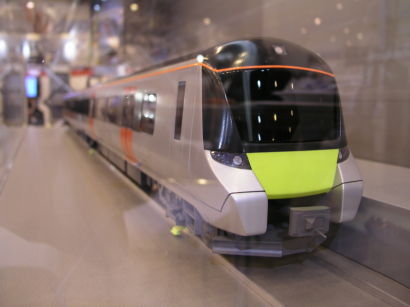BUSINESS and council leaders in Derby are warning that the award of the Thameslink rolling stock contract to Siemens has placed 20,000 jobs at risk, and are urging the Prime Minister to intervene.
A delegation from the city has been holding urgent talks at the Bombardier global HQ in Berlin over the past couple of days, because they were alarmed at reports that the company was now reviewing its UK activities after losing the £1.5 billion contract, with a decision due within the next two months.
One member of the Derbyshire group in Berlin was John Forkin, the managing director of Marketing Derby, an agency which is funded partly by the city council and partly by local businesses.
He told Railnews: “It was a useful visit, and we now have a relationship at a very senior level in Bombardier. The point is that this procurement decision was weak. The process was very narrow, with no consideration given to the effect on the local economy.”
Adam Wilkinson, the chief executive of Derby City Council, said the decision to choose Siemens was surprising. “Bombardier were disappointed and shocked that they lost the contract to Siemens,” he said. “Their bid included technological advantages and was highly competitive.
“We are now seeking an urgent meeting with the Prime Minister, which we understand will take place in early July. We want him to intervene. If Bombardier did leave Derby 6,800 jobs would be lost, and another 13,000 or so could follow in the wider supply chain.”
Chris Williamson, the MP for Derby North, has launched a petition to the House of Commons, which urges the transport secretary to reverse the decision in favour of Bombardier.
Bombardier has been saying only that it was 'disappointed', and has sought a debriefing from the Department for Transport on how it came to lose at the final hurdle. Two days before the Thameslink announcement on 16 June, Bombardier had learnt that it had won a £354 million contract to renew the signalling on the subsurface lines of London Underground, although some of the work for this will be done overseas.
Others are also worried. One Railnews reader wrote: “I have lived in Derby all my life. We are in shock today, and cannot believe they have given the contract to Siemens. Derby has a railway heritage going back over 100 years. Everyone knows someone who works there.”
As Siemens is only preferred bidder so far, with the contract not expected to be signed before November at the earliest, no details of the winning bid have been released. However, industry sources are suggesting that the German firm won the day, at least in part, by offering a more attractive financing deal, which could in turn have the effect of reducing the long-term leasing costs.
Siemens managing director for rolling stock in the UK, Steve Scrimshaw, said he was delighted. He added: "Our selection is a significant achievement, not only for the rolling stock teams both in the UK and Germany but for Siemens overall."
In a statement, the company added that the selection had been made on strict evaluation criteria, with focus on deliverability, affordability and value for money. Although some of the components are set to be made in Britain, the trains themselves will be built in Germany.
The fleet will be the first production run of Siemens' new Desiro City units (model, pictured), which have been developed for the British market.
Siemens is in partnership with Cross London Trains, a consortium of Siemens Project Ventures, Innisfree and 3i Infrastructure. The name is not without significance: the next major rolling stock contract in Britain will be for the Crossrail fleet, and some industry observers have already suggested that the winner of the Thameslink contract is likely to be favourite to build the Crossrail trains in due course as well.


